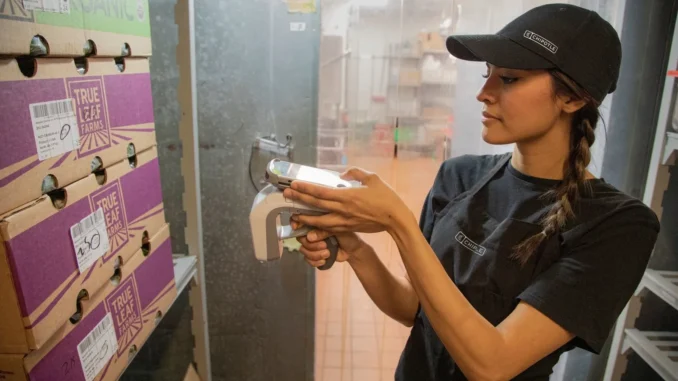
By Lea Mira and Gavriel Shohet, Staff Writers, RTN - 5.19.2024
When supply chain operations are outsourced, maintaining visibility becomes crucial. This is a lesson well understood by Chipotle Mexican Grill, which boasts over 3,300 restaurants in the United States, Canada, the United Kingdom, France, and Germany, with its extensive third-party reliant supply chain.
To enhance visibility, Chipotle, which is widely viewed as a leading technology innovator in the food industry, has implemented radio frequency identification (RFID) tags across its supply chain. These smart barcodes automatically identify and track inventory, a technology commonly used in retail but novel in the restaurant industry. Chipotle is reportedly the first restaurant chain to adopt RFID technology on this scale.
Chipotle’s RFID rollout is part of a broader strategy to improve inventory visibility and operational efficiency. The company is working to implement RFID technology nationally, following a successful pilot program in the Chicago area. Following the pilot, the company began equipping suppliers with the necessary technology, software, printers, and infrastructure to support the rollout.
The implementation process starts with a single restaurant to address any issues before expanding to a group of locations and eventually a full region. Recently, Chipotle successfully introduced RFID technology in Southern California and plans to extend it to all 3,500 restaurants by the end of the year.
RFID technology has proven particularly useful for managing limited-time offers, such as Chipotle’s Chicken al Pastor. These promotions require extensive preparation, often a year in advance, and involve coordinating with additional suppliers. RFID helps monitor inventory levels and ensures traceability throughout the supply chain, from distribution centers to transportation companies.
Before RFID, Chipotle restaurant managers had to manually scan each barcode, a time-consuming process. Now, RFID allows managers to quickly and efficiently scan inventory, improving both speed and accuracy.
Beyond RFID, Chipotle is also enhancing its supply chain technology with Oracle’s platform. The company is developing a project called “supplier visibility,” which integrates various technologies to provide comprehensive insights into inventory, shipments, and supplier information. This project aims to offer a complete view of the supply chain, from raw materials to finished products.
Chipotle is also upgrading its enterprise resource planning (ERP) system with Oracle to improve data management and operational efficiency. There is no discounting the importance of having a centralized ERP system for companies with significant scale. The new system will enable Chipotle to gain better visibility and control over its supply chain operations.
In addition to supply chain innovations, Chipotle has made strategic investments in sustainable farming technologies. In February, the company announced minority investments in Greenfield Robotics and Nitricity through its $50 million Cultivate Next venture fund. These investments align with Chipotle’s mission to support sustainable farming and reduce greenhouse gas emissions.
Greenfield Robotics uses AI, robotics, and sensing technologies to make regenerative farming more efficient. Their autonomous robots reduce the need for herbicides by cutting weeds between crop rows. Chipotle’s investment will help Greenfield Robotics expand its fleet and develop new capabilities, such as micro-spraying, cover crop planting, and soil testing.
Nitricity produces sustainable fertilizer using air, water, and renewable energy from artificial lightning. This process significantly reduces greenhouse gas emissions compared to traditional nitrogen fertilizer production. Chipotle’s investment will support Nitricity in scaling up production, building infrastructure, and launching its first commercial product within the next two years.
Chipotle’s adoption of advanced technology extends to its restaurant operations. The company is testing an automated digital makeline in collaboration with Hyphen, a foodservice platform that automates kitchen operations. This system is designed to prepare bowls and salads, freeing up team members to focus on other tasks and improving order accuracy.
Additionally, Chipotle has developed Autocado, an avocado processing cobotic prototype in partnership with Vebu. Autocado automates the tasks of cutting, coring, and peeling avocados, significantly reducing guacamole preparation time. This innovation allows employees to focus more on customer service.
Chipotle’s technology-driven initiatives also include Chippy, an autonomous kitchen assistant for making tortilla chips, and a kitchen management system that uses machine learning to optimize ingredient freshness and minimize food waste. These systems analyze real-time data and operational simulations to create algorithms that enhance performance and efficiency.
Chipotle’s focus on supply chain technology and innovation is transforming its operations, improving efficiency, and enhancing the guest experience. By leveraging advanced technologies and strategic investments, the company is well-positioned to lead the industry in supply chain management optimization and overall business improvement.

